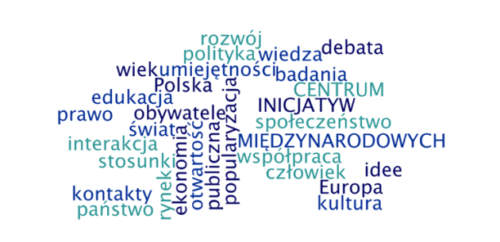ANITA SĘK
 Four intensive days; hours of discussions; two working groups; 29 participants, among them 14 Chinese and 15 Europeans… The second (after the meeting in Chengdu, China) EU-China Youth Policy Dialogue was held in Brussels between 18 and 23 March 2012. I had a pleasure to represent the Centre for International Initiatives and the College of Europe at that event.
Four intensive days; hours of discussions; two working groups; 29 participants, among them 14 Chinese and 15 Europeans… The second (after the meeting in Chengdu, China) EU-China Youth Policy Dialogue was held in Brussels between 18 and 23 March 2012. I had a pleasure to represent the Centre for International Initiatives and the College of Europe at that event.
The project, financed jointly by the “Youth in Action” programme of the European Commission and the Chinese Guanghua Foundation and organized by the European Institute for Asian Studies and the Chinese Association for European Studies, was impressive. Starting from a careful selection of really fantastic participants, guaranteeing hot debates, through logistics, to an ability to visit and talk to EU institutions’ officials. Thus, we had a chance not only to listen to distinguished Members of the European Parliament, officials of the EEAS and the European Commission, or to participate in a meeting of EP’s Delegation for relations with China with a guest spech of Prof. F. Godement, but also to meet representatives of European Youth Forum, Chinese Association in Europe and
had a chance not only to listen to distinguished Members of the European Parliament, officials of the EEAS and the European Commission, or to participate in a meeting of EP’s Delegation for relations with China with a guest spech of Prof. F. Godement, but also to meet representatives of European Youth Forum, Chinese Association in Europe and  youth media. A visit to the College of Europe in Bruges in order to hold a debate with the students on EU-China relations, finished with an integration dinner, was an inevitable element of the programme.
youth media. A visit to the College of Europe in Bruges in order to hold a debate with the students on EU-China relations, finished with an integration dinner, was an inevitable element of the programme.
Here I present a few free thoughts on the event.
Naturally, the main objective of the project was to bring the young Europeans and Chinese closer, in order to enable them to meet each other, to get to know our worldviews, to notice the differences in our perceptions, to share knowledge and life experiences, in short: to learn together and to have fun together. Being divided into the two main working groups, we were supposed to discuss issues of Youth Policy as well as Climate Change. Nevertheless, our chats were often going beyond the mould, encompassing matters of democracy, human rights, civil society, Tibet and Dalai lama, international politics and law… Did you know for example that in Chinese a word ‘citizenship’ is non-existent? Or that there is not any single term for ‘civil society’? Chinese society is understood through a notion of ‘collective’, in contrary to European ‘individual’, therefore ‘civil society’ is translated with words used for a ‘city’ or ‘public’. Interestingly, the Chinese use phrases like ‘non-governmental organisations’, but they admit that none of them is truly independent from the government, and some are directly managed by the state authorities, like the All-China Youth Federation or the Communist Youth League, GONGOs (Governmentally Organized NGOs) dealing mainly with social and sport activities.
What is even more intriguing is the fact that the Chinese are much more aware of these linguistic differences than are we, the Europeans, even though they speak fluent English. Here our euro-centrism reveals its face. To understand that our language (English) and its semantics is not that universal, is like a cold shower for somebody like me who never thought about it in this way. To be aware of it is a first step to understand where these differences come from. It seemed as if the Chinese were prepared for the explanation: because of different historical curricula. Europe had its ancient philosophy, its Christianity, its Renaissance, its monarchs and nation states, its Enlightenment, colonization and world wars, on whose ruins the European integration could have taken place – they were convincing us. – China had a different path of development, with a traumatic events of Opium wars, inevitably connected to the West, which still result in a complex of inferiority towards the Europeans. 1.5 billion population that feels being worse than us and is still afraid of us – doesn’t it sound incredible?!
Besides language, the participants noticed a few other difficulties in communication, the main being a de facto existence of ‘two Internets’: while we in the West are using Facebook and Twitter, Chinese have their own Renren (人人网) and Sina Weibo (新浪微博), how and where can we then meet is a huge philosophic and logistic question…
For me, who has never had a real closer contact with Chinese people, these discoveries are of unprecedented nature and I regard them as my personal biggest added value of the meeting. An acquisition of the awareness of a need of the mutual respect leading to an endeavour of understanding of others’ perceptions – this is my absolutely exceptional and priceless experience.
***
The results of the project in the form of recommendations for European and Chinese stakeholders are available at euchinayouth.eu.



[…] tej współpracy. Kolejnym wydarzeniem, z zakresu współpracy EU-Chiny była konferencja EU-China Youth Policy Dialogue, która odbyła się w marcu w Brukseli. Naszym reprezentantem na niej była Anita […]